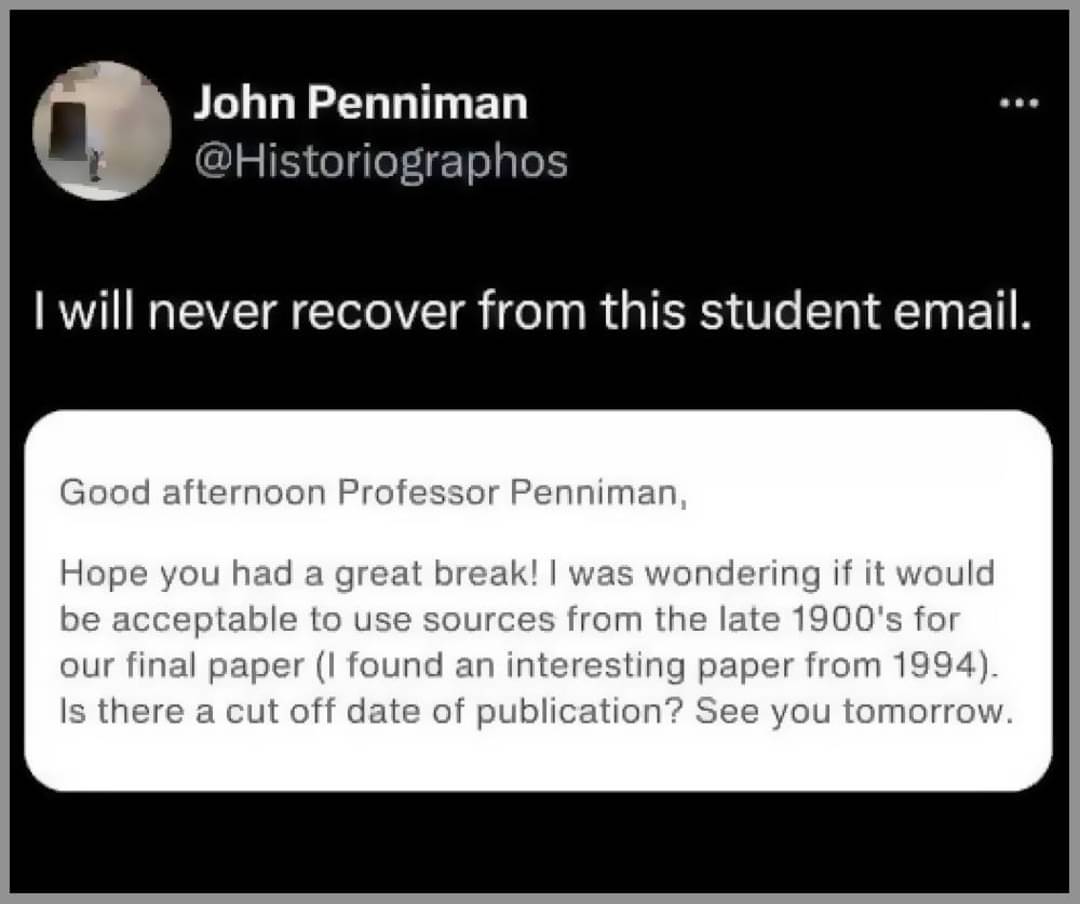this post was submitted on 18 Oct 2024
1447 points (99.5% liked)
Science Memes
11047 readers
3491 users here now
Welcome to c/science_memes @ Mander.xyz!
A place for majestic STEMLORD peacocking, as well as memes about the realities of working in a lab.

Rules
- Don't throw mud. Behave like an intellectual and remember the human.
- Keep it rooted (on topic).
- No spam.
- Infographics welcome, get schooled.
This is a science community. We use the Dawkins definition of meme.
Research Committee
Other Mander Communities
Science and Research
Biology and Life Sciences
- !abiogenesis@mander.xyz
- !animal-behavior@mander.xyz
- !anthropology@mander.xyz
- !arachnology@mander.xyz
- !balconygardening@slrpnk.net
- !biodiversity@mander.xyz
- !biology@mander.xyz
- !biophysics@mander.xyz
- !botany@mander.xyz
- !ecology@mander.xyz
- !entomology@mander.xyz
- !fermentation@mander.xyz
- !herpetology@mander.xyz
- !houseplants@mander.xyz
- !medicine@mander.xyz
- !microscopy@mander.xyz
- !mycology@mander.xyz
- !nudibranchs@mander.xyz
- !nutrition@mander.xyz
- !palaeoecology@mander.xyz
- !palaeontology@mander.xyz
- !photosynthesis@mander.xyz
- !plantid@mander.xyz
- !plants@mander.xyz
- !reptiles and amphibians@mander.xyz
Physical Sciences
- !astronomy@mander.xyz
- !chemistry@mander.xyz
- !earthscience@mander.xyz
- !geography@mander.xyz
- !geospatial@mander.xyz
- !nuclear@mander.xyz
- !physics@mander.xyz
- !quantum-computing@mander.xyz
- !spectroscopy@mander.xyz
Humanities and Social Sciences
Practical and Applied Sciences
- !exercise-and sports-science@mander.xyz
- !gardening@mander.xyz
- !self sufficiency@mander.xyz
- !soilscience@slrpnk.net
- !terrariums@mander.xyz
- !timelapse@mander.xyz
Memes
Miscellaneous
founded 2 years ago
MODERATORS
you are viewing a single comment's thread
view the rest of the comments
view the rest of the comments

Isn't this an actual thing? Pretty sure I was told by some instructor not to use references older than a decade or two. Unless the subject is very elementary older sources are more likely to be obsolete
Depends on the subject. Historians use a lot older materials more regularly for obvious reasons.
And even then it's probably not a hard rule as much as a good heuristic: the older a source is, the more careful you should be citing it as an example of current understanding, especially in a discipline with a lot of ongoing research.
If somebody did good analysis, but had incomplete data years ago, you can extend it with better data today. Maybe the ways some people in a discipline in the past can shed light on current debates. There are definitely potential reasons to cite older materials that generalize well to many subjects.
Well said. :)
Ofc
In chemistry a lot of the foundational synthesis and work is as old as the 60s and 70s; people build on it, but in some cases those early papers said pretty much all there is to be said on a topic, so there's no reason to republish on it.
I've had to cite papers as old as the late 30s before, because no one has ever found anything to fix or correct about their work! Pretty impressive if you ask me, given how few tools they had.